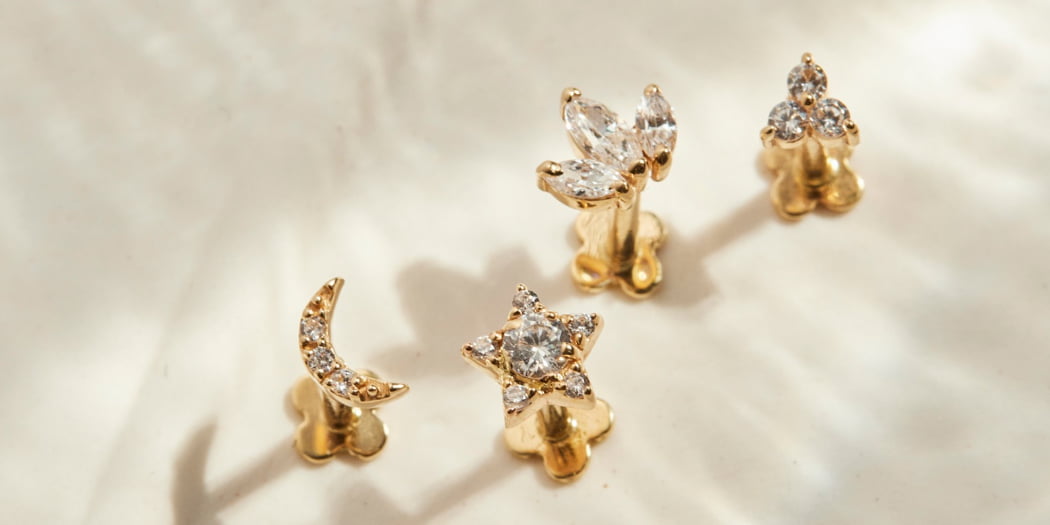In this article, we answer all questions about piercing aftercare. You will learn how to care for your piercings to avoid possible inflammation and allergic reactions, as well as shorten the healing time. You will also learn what measures you should take if your piercing is inflamed. Once a piercing has healed, it is usually very easy to care for. We will explain which earrings and piercings you should ideally wear.
Why is proper ear piercing aftercare important?
Ear piercing care is very important for both health and aesthetic reasons. When piercing, a sterile needle penetrates your skin layer and injures your body. This creates a wound at the desired body site, which is very susceptible to germs, bacteria or infections. If you follow our care instructions, your wound healing should be complete after just a few weeks to months, depending on the piercing site.
Proper care starts with the piercing itself
If you decide to get a new piercing, we advise you to choose a trustworthy and professional piercing studio. Make sure that the piercer works hygienically and uses a sterile piercing made of high-quality materials. If you have your ear pierced, you can also do this without hesitation with all of our Ear Studs Gold . We always recommend using only Studs for piercing until the piercing channel has completely healed, as the piercing channel would adapt to the round shape of hoops, for example.
Hypoallergenic Materials
To avoid allergic reactions, you should choose a piercing made of hypoallergenic materials. Gold, titanium and stainless steel are materials that are generally very well tolerated by everyone. Our ear studsare ideal for freshly pierced ears because they are made of 14K gold.

Ear Piercing care in the first weeks
Intensive piercing aftercare is essential in the first few weeks. You should neither touch nor change your freshly pierced piercing at the beginning, as this could irritate the wound. You should also ideally wash your hands regularly and disinfect the area 1-2 times a day.
When disinfecting, first spray and clean the parts of the piercing that are not under the skin so that no bacteria from the outside get into the wound. Then move the piercing 4-5 times in the stitch canal so that the wound is also disinfected.
In the first few days, avoid taking blood-thinning medication and refrain from sports for the first few weeks. Getting enough sleep and eating a healthy diet will also have a positive effect on wound healing. Avoid contact with foreign bodily fluids, such as sweat or saliva.
Water and sun
For the first 2-4 weeks, you should avoid water containing chlorine with a freshly pierced piercing. When swimming in the lake, it is important to seal the piercing area as waterproof as possible with a plaster. Showering is possible, but contact with shower gel or peelings should be avoided. UV rays delay the healing process and can damage the skin around the piercing, so we recommend avoiding direct sunlight and tanning beds for the first few weeks.
Signs of a Piercing Inflammation
-
The area around the piercing is swollen.
-
Severe redness can be seen in the wound area.
-
The area feels very warm and throbbing.
-
Green or yellow pus comes out of the piercing wound.
-
In very few cases, you may get a fever
-
In case of severe inflammation Cold symptoms
-
Excessive sensitivity and pain at the piercing site
All of these listed symptoms are signs of a piercing inflammation.
An unkempt piercing can lead to problems such as scarring and abscesses.
How do I care for my piercing if it gets infected?
In case of very severe infections, you should definitely consult a doctor or a professional piercer. They can recommend the best possible treatment for you.
If you have slight swelling, you don't have to remove the piercing immediately, as the hole would close up. If the situation worsens, you should definitely seek professional help.
Am I allowed to touch my piercing?
If you have a freshly pierced piercing, special care is required. The wound is very sensitive and can easily become inflamed if care is neglected. When cleaning or caring for your piercing, it is important to only use clean and washed hands or disposable gloves. Disposable gloves from the packaging are not sterile and must be washed or disinfected before use. Touch the piercing as little as possible with your fingers to prevent bacteria and germs from entering the wound.
If you do happen to touch the piercing with your fingers, be sure to disinfect the area to prevent pathogens such as bacteria from entering the wound.
Does a healed piercing need care?
A completely healed piercing is generally very easy to care for. You should not remove your piercings, as the piercing channel will begin to close after just a few hours or days. If this happens, reinserting the jewelry can be painful and lead to inflammation. If a hole has already closed, the piercing must be re-pierced by a piercer.
When showering, the jewelry should be washed as sebum and sweat can settle. Move the piercing or earring a little and rinse it thoroughly.
Our gold ear studsandgold hoop earringsare ideal as everyday jewelry because, thanks to their high-quality materials and workmanship, they never have to be taken off and never lose quality.
Conclusion
Avoid removing the jewelry too early or changing the piercing. Complete healing can take several weeks to months, depending on the location of the piercing. The healing time can also vary from person to person.
Every body and every piercing is unique, so be sure to follow your piercer's specific care instructions to ensure trouble-free healing.
By following the tips we provide, you can minimize the risk of infection and support the healing of your piercing.
If you are unsure or have any questions, don't hesitate to contact your piercer. With careful care, you can soon wear your new body jewelry without any worries!


